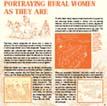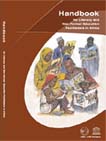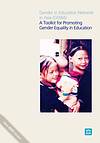
 |
CORE THEMES
|  |
 |
Special interests
|  |

|  |  |
 |
4 - Gender-responsive methodologies and guidelines for planning, teaching and training
|
News
| Literacy - a Key to Empowering Women Farmers - (UNESCO ED/BAS)
 (UNESCO, 2001) The Educate to Empower model developed by UNESCO is an approach to literacy that seeks to incorporate women’s empowerment into learning programmes. During the past ten years, UNESCO has offered training workshops based on this model in countries in Africa, Asia and the Pacific as part of the UNESCO/UNDP project Expansion of Skills-Based Literacy Programmes for Women and the UNESCO/DANIDA programme Special Project for Women and Girls in Africa. This booklet describes the significant conclusions of this effort, and illustrates its findings with stories and pictures taken from learning materials developed by the participants in these workshops. (UNESCO, 2001) The Educate to Empower model developed by UNESCO is an approach to literacy that seeks to incorporate women’s empowerment into learning programmes. During the past ten years, UNESCO has offered training workshops based on this model in countries in Africa, Asia and the Pacific as part of the UNESCO/UNDP project Expansion of Skills-Based Literacy Programmes for Women and the UNESCO/DANIDA programme Special Project for Women and Girls in Africa. This booklet describes the significant conclusions of this effort, and illustrates its findings with stories and pictures taken from learning materials developed by the participants in these workshops. |
| Education for a Culture of Peace in a Gender Perspective - (UNESCO Publishing)
 (UNESCO, 2001) This publication, based on a comprehensive, gender-sensitive approach to peace education, has been written during the first year of the United Nations International Decade for a Culture of Peace and Non-violence for the Children of the World (2001-2010). (UNESCO, 2001) This publication, based on a comprehensive, gender-sensitive approach to peace education, has been written during the first year of the United Nations International Decade for a Culture of Peace and Non-violence for the Children of the World (2001-2010). |
| Handbook for Literacy and Non-formal Education Facilitators in Africa - (UNESCO ED/BAS/LIT)
 (UNESCO 2006) - This handbook constitutes the first step towards developing a holistic regional resource package for non-formal-Education personnel in Africa. It is designed as a basic guide for responding to the specific needs of learners and promoting knowledge and skills in the fields of reading, writing and numeracy. Module 7, Section 2, specifically deals with gender-related issues. 151 pages (UNESCO 2006) - This handbook constitutes the first step towards developing a holistic regional resource package for non-formal-Education personnel in Africa. It is designed as a basic guide for responding to the specific needs of learners and promoting knowledge and skills in the fields of reading, writing and numeracy. Module 7, Section 2, specifically deals with gender-related issues. 151 pages |
| GENIA Toolkit for Promoting Gender Equality in Education - 2004 Version - (UNESCO Bangkok)
 (UNESCO, 2004) The GENIA Toolkit was designed to be a cluster of resources for use by Education planners and implementers to incorporate gender equality into their work. This 2004 version has been revised and expanded with tools for Classroom Observation Tools and a Gender Lens for Community Learning Centers (CLCs). (UNESCO, 2004) The GENIA Toolkit was designed to be a cluster of resources for use by Education planners and implementers to incorporate gender equality into their work. This 2004 version has been revised and expanded with tools for Classroom Observation Tools and a Gender Lens for Community Learning Centers (CLCs). |
| Gender & HIV/AIDS. - (UIE/SAfAIDS 2002)
 A Report of the International Workshop on the Development of Empowering Educational HIV/AIDS Prevention Strategies and Gender Sensitive Materials (Nairobi Kenya, 9-13 July 2001. Based on the experiences presented in the workshop, participants identified relevant gender issues that affect prevention work and elaborated strategies to tackle them effectively, resulting in principles of empowering prevention strategies. The purpose of this publication is to analyse different HIV prevention programmes and on the basis of this develop guidelines for designing gender-sensitive materials. A Report of the International Workshop on the Development of Empowering Educational HIV/AIDS Prevention Strategies and Gender Sensitive Materials (Nairobi Kenya, 9-13 July 2001. Based on the experiences presented in the workshop, participants identified relevant gender issues that affect prevention work and elaborated strategies to tackle them effectively, resulting in principles of empowering prevention strategies. The purpose of this publication is to analyse different HIV prevention programmes and on the basis of this develop guidelines for designing gender-sensitive materials. |
| Guidelines for Preparing Gender Responsive EFA Plans - (UNESCO Bangkok)
 (UNESCO Bangkok, 2002). These guidelines have been prepared to assist you and your 'team' to produce EFA plans that are gender responsive. The document aims to raise awareness about a number of aspects that you need to consider in order to produce plans leading to the achievement of gender equality in education. Further information and guidance regarding gender issues in education can be found in books and websites referred to at the back of this document. For general planning issues, please refer to the EFA Planning Guide, produced by UNESCO Bangkok. (UNESCO Bangkok, 2002). These guidelines have been prepared to assist you and your 'team' to produce EFA plans that are gender responsive. The document aims to raise awareness about a number of aspects that you need to consider in order to produce plans leading to the achievement of gender equality in education. Further information and guidance regarding gender issues in education can be found in books and websites referred to at the back of this document. For general planning issues, please refer to the EFA Planning Guide, produced by UNESCO Bangkok. |
| Addressing Gender Relations in HIV Preventive Education - (UIE - Hambourg)
 (UNESCO, 2002) This publication is one of the outcomes of UIE’s project on “Developing Empowering Educational Strategies and Gender-Sensitive IEC Materials for HIV Prevention” which aims at (1) working out a gender perspective on HIV preventive education, (2) reviewing existing educational strategies and IEC materials in the light of this perspective and (3) developing empowering educational strategies and gender-sensitive IEC materials. (UNESCO, 2002) This publication is one of the outcomes of UIE’s project on “Developing Empowering Educational Strategies and Gender-Sensitive IEC Materials for HIV Prevention” which aims at (1) working out a gender perspective on HIV preventive education, (2) reviewing existing educational strategies and IEC materials in the light of this perspective and (3) developing empowering educational strategies and gender-sensitive IEC materials. |
| Database of curricular material for HIV/AIDS education - (UNESCO - International Bureau of Education)
The UNESCO International Bureau of Education (IBE) collects, selects and disseminates through its on-line database examples of good practice for HIV/AIDS prevention in formal settings, and includes specific entries on good practice on gender and HIV/AIDS prevention. |
|

|
|

